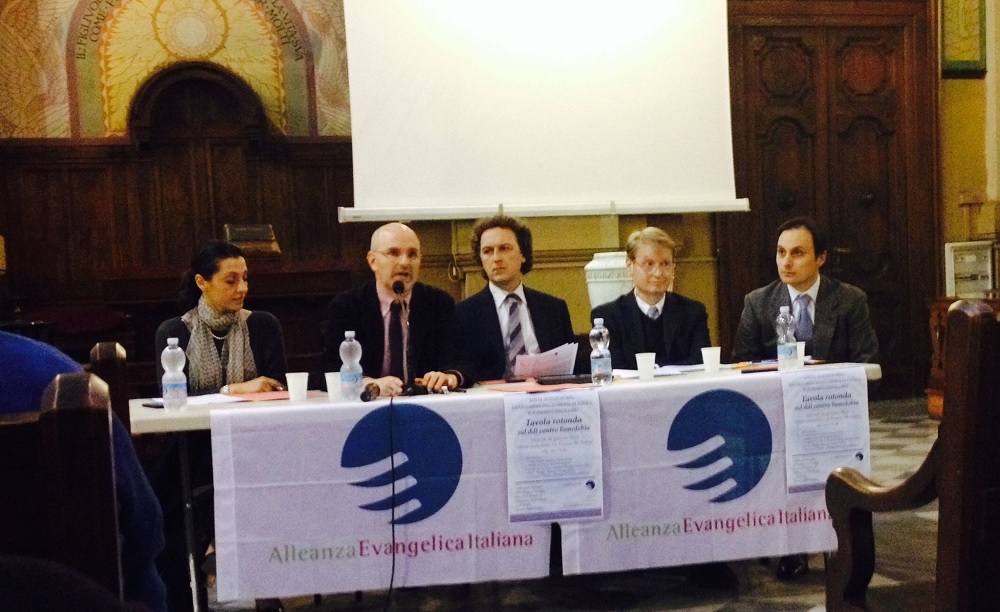An open debate with Italian politicians organized by the Italian Evangelical Alliance (AEI)
The Bill against homophobia, currently being discussed in the Italian Senate, could have a paradoxical effect: on the one hand, it aims at protecting people who are discriminated against on the grounds of their sexual orientation or transexuality, while on the other hand, it could undermine the right of anyone to freely express convictions that are in contrast with a “politically correct” vision of sexuality. Could a preacher continue talking about “sin” without being accused of homophobia? Could anyone suggest a change of conduct without receiving the “homophobe” label? At school, would it still be possible to promote the idea that marriage is between a man and a woman without being branded as homophobic?
These are the questions in the background of the round table organized by AEI in Rome on January 16th, 2014.
AEI had already expressed its concerns in a document dated 7/21/2014, and has seized the opportunity of the presentation of this Bill in the Senate to organize a public debate with the participation of a number of MPs of three different parties: Irene Tinagli, Lucio Malan, Mario Staderini and Giacomo Ciccone (President of AEI).
Mrs Irene Tinagli (who is among the first to have signed the Bill) explained the motivations underlying a legislative intervention against homophobia. There are still many residues of prejudice against homosexuals and these feelings often turn into discriminations. This unacceptable situation requires a legislative intervention. Lucio Malan criticized the current Bill because, even though it aims at tackling discrimination, it doesn’t clearly define what this discrimination means and thus opens the door to discretional interpretations that could very well include opinions that are contrary to the gender ideology.

Giacomo Ciccone affirmed that there is indeed a problem of homophobia. According to the Biblical vision, nobody is “sexually normal” considering that we all live sexuality in a distorted way. It is also true that Christian culture considers marriage to be a covenant relationship within which one can fully live his/her sexuality. Mr Ciccone agreed that the current Bill does not define what is discrimination and what it is not. This is the reason why he suggested to consider the Waddington Amendment that was inserted in the British law on homophobia.
The amendment reads as follows: “the discussion or criticism of sexual conduct or practices or the urging of persons to refrain from or modify such conduct or practices shall not be taken of itself to be threatening or intended to stir up hatred”. This elucidation could very well be inserted in the well-constructed Bill currently being discussed and therefore provide the needed clarification and defend the freedom to express different views about sexuality, without condemning any. Mario Staderini recognized that the current Bill is a typical expression of the “legal uncertainties” that give to the Judge a wide margin to apply his discretionary power. We urgently need a clear definition of “discrimination” and “incitement to hatred”, and have to foresee civil and administrative penalties, leaving aside the sphere of criminal law.
In conclusion, Leonardo De Chirico, vice president of AEI, underlined how the Evangelicals wish to contribute to the good of a society going toward full recognition of pluralism and full freedom of speech. After being the victim of a State religious ideology, Italy risks to fall into a gender ideology made mandatory by law. In this scenario the big loser will be the possibility to live in a plural society in which different point of views can be expressed without criminalisation. This is the contribution that the evangelical minority intends to give to the ongoing debate.
Alleanza Evangelica Italiana, www.alleanzaevangelica.org





Stay Connected